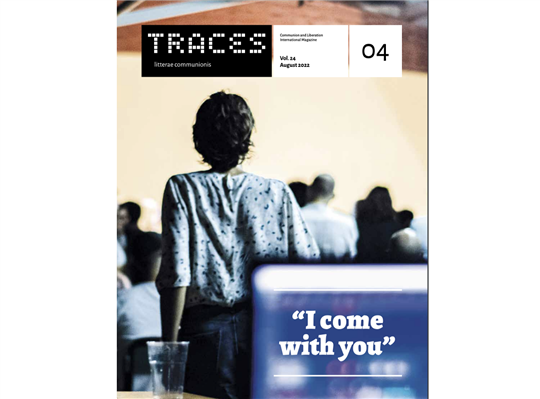
Traces, No. 4, August 2022
Room for breathing freelyThey’re the most alive thing I’ve ever encountered,” says Luis from Puerto Rico, speaking of friends he’d met at his university. This issue offers the testimonies of university students in various parts of the world who are reliving “the origin of Christianity, two thousand years later,” as they recount. This life in them emerges in their relationship with classmates, in facing an exam, when they are involved in student elections or in judging what is happening in the world. They learn to look at themselves and others with the same esteem they have received, and are a presence simply by living. Now that the academic year has ended, the classrooms have emptied, and vacation time is beginning, it is the same commitment as ever, the most important of them all, to life and one’s own humanity. For this reason, we want to introduce this issue with a passage from “The Time of Freedom,” notes from Fr. Giussani’s words on vacation, the full text of which you can find at english.clonline.org.
“I understand what a person (young or adult) truly wants not from his work or studies, which he has to do out of social pressure or necessity, but from how he uses his free time. If a young person or an adult wastes his free time, he does not love life; he is a fool. Vacation is in fact the classic time when almost everybody becomes a fool. On the contrary, vacation time is the noblest time of the year, because it is the moment when one becomes as involved as he likes in the value he recognizes as dominant for his life, or he doesn’t get involved in anything at all, and then he is, as I said, a fool... Man’s highest value, his virtue, courage, energy, what makes life worth living, lies in gratuitousness, in his capacity for gratuitousness. And it is in free time that gratuitousness truly comes out and affirms itself in an amazing way. The way one prays, one’s faithfulness to prayer, the truth of one’s relationships, one’s self-dedication, enthusiasm, humble approach to reality, emotional involvement and compassion toward things, all this is much more evident during vacation than during the year. On vacation one is free, and if he is free, he does what he wants. This means that vacation is important. First of all, it demands attention in the choice of companions and place, but above all it concerns the way one lives: if vacation never reminds you of what you should remember more often, if it doesn’t make you better toward others, but makes you respond more to instinct than to reason, if it doesn’t teach you to look at nature with profound intention, if it doesn’t make you make sacrifices joyfully, then your time of rest has not achieved its purpose. Vacation should be as free as possible. The criterion of vacation time is to have some breathing room and, if possible, room for breathing deeply.”